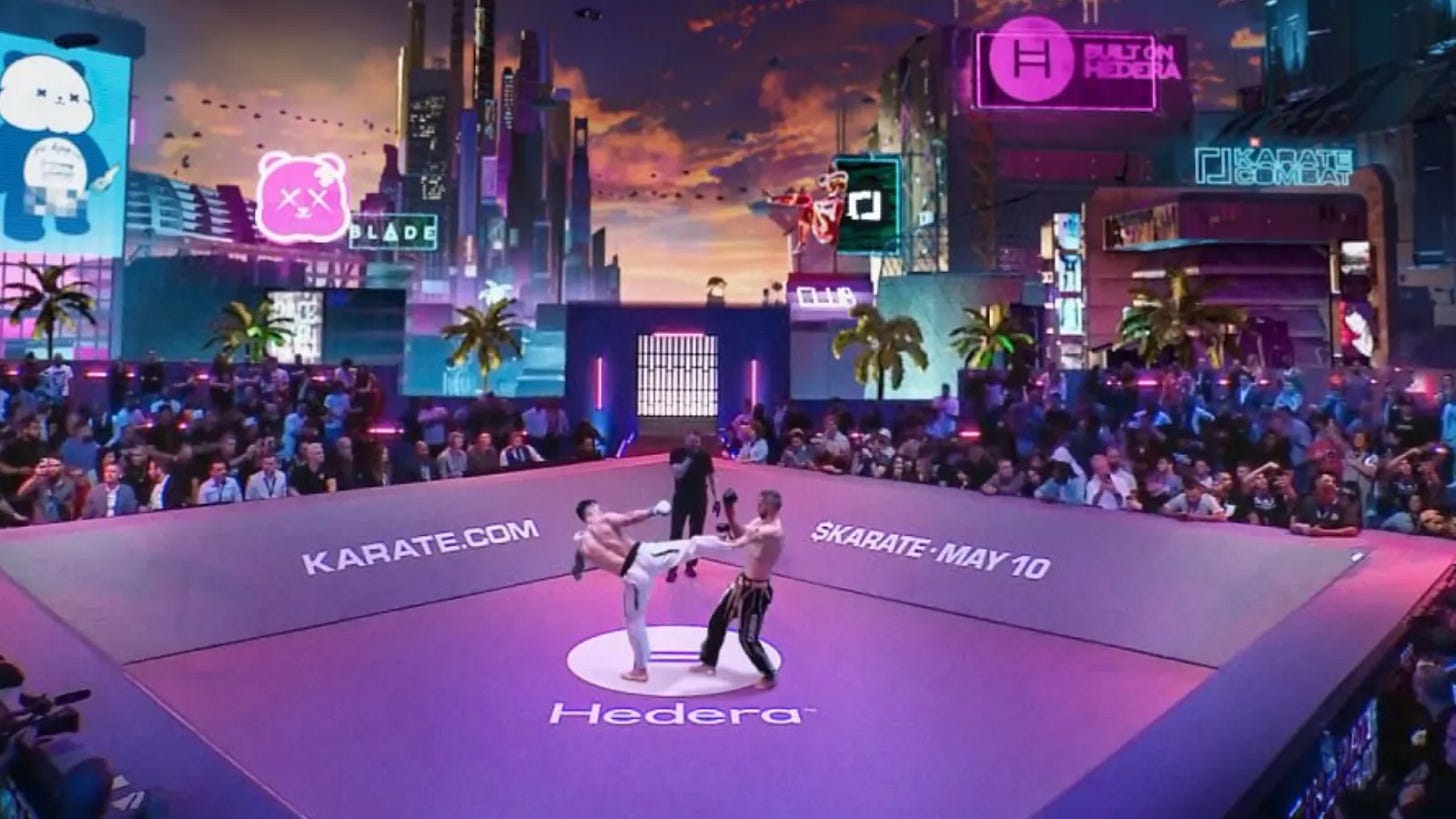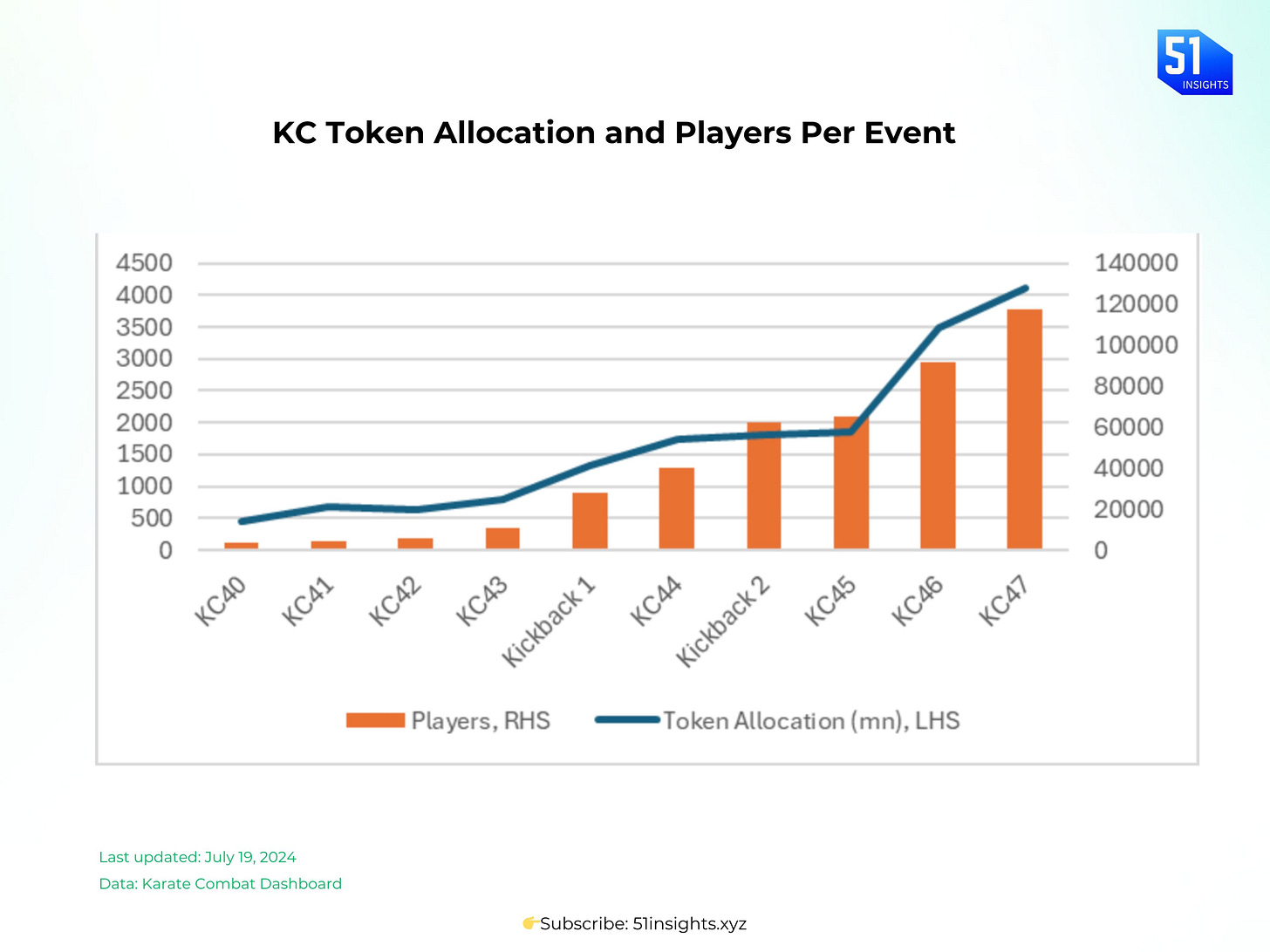Karate Combat: Reinventing Fan Engagement 🥋
Karate Combat, a full-contact sports league, pioneers a new fan engagement and loyalty model with Web3. How it works & how you can adopt this for your brand.
In an era where fan engagement is paramount, Karate Combat, a full-contact sports league, is redefining the playbook.
By turning their marketing budget into direct incentives for fans, they’ve pioneered a model that drives deep engagement and loyalty.
They’ve created an interactive, Web3 powered ecosystem where fans not only watch but actively participate and profit.
This isn't just a game-changer for sports; it can be blueprint for any brand looking to foster a deeper connection with their audience.
Let’s unpack this. 📦
What’s Karate Combat?
Karate Combat, a full-contact sports league, has adopted Web3 technology by launching a DAO and its governance token,$KARATE. This approach, combining live-action and CGI with fan-powered tokenomics, enhances direct fan engagement by removing third-party ad platforms and incentivizing community participation.
Using crypto to gain traction: Karate combat captured the attention of cryptoverse when Bitboy had a face-off with More Light, founder of meme coin HarryPotterObamaSonic10Inu, causing meme coin price swings. Recently, Fyre Fest's Billy knocked out Justin Catardo, who had promised to take revenge on the Fyre victims but lost gas in the second round. Joe Rogan's interest in Karate Combat, despite his dislike for their angled walls, adds to their cultural clout.
The Bitboy moment brought them into the CT spotlight; for them, it's about building brand awareness.
👉 Want to get in front of 50k+ business leaders or accelerate your growth? Work with us here.
Stepping Back
Act 1—Founded in 2018, Karate Combat initially had rules similar to the UFC but without grappling. This resulted in faster-paced fights, which clicked with the younger audience it was targeting.
Act 2 - Elevated the game with the Up Only Gambling concept & used their token $KARATE to make it work. Used the token to incentivize people to bid without any fear of losses.
This is key: Fans are financially incentivized to engage – and they can’t lose. This is the reason why Karate Combat doesn’t fall into gambling regulation.
Act 3 - Became the first live sports league to transition into a DAO in 2022 to give power to the hands of their fans. Fans who had just engaged before became part of the action. This move was a key part of Karate Combat’s three-year sponsorship deal with The HBAR Foundation, a major player in the Hedera ecosystem.
Competitive Landscape
One of their contenders is Crypto Fight Night. Both blend sports with Web3 but with different approaches. Karate Combat offers professional fighting integrated with Web3, while Crypto Fight Night centers on CT influencers-driven charity matches.
Digital Strategy in Sports Leagues: Many major sports teams, like the Chicago Bulls, Tampa Bay Buccaneers, Paris Saint Germain, and Tottenham Hotspur, are creating fan tokens. These tokens not only gamify fan experiences but also unlock exclusive events, making fans feel valued and integral part of the team.
The Karate Combat Model: Sharing Profits with Fans
While fan tokens offered by major sports teams certainly enhance fan engagement through gamified experiences and providing exclusive access, Karate Combat takes fan interaction a step further by offering direct financial incentives.
How it works: Karate Combat is a fighting league where viewers can back fighters before events (held roughly once a month)using their $KARATE tokens that support their Up Only gaming platform. The winners receive a ~5-10% increase in tokens (funded by treasury allocations) and the losers receive their full stake back. The users generally don’t leave after making incorrect initial picks and are more likely to remain engaged.
This creates a flywheel for fans as they can use the $KARATE token to bet and create a tangible financial stake in the league’s future. This keeps them coming back. It also creates a sense of ownership and shared success within the Karate Combat community, a proven win in the Web3 projects.
Moreover, it allows the league to circumvent reliance on traditional third-party advertising platforms to reach its audience, build a direct connection with fans and use financial incentives to drive growth and engagement.
Maja Vujinovic, MD at OGroup and early blockchain investor, says:
Since the early days of ICOs, I noticed a one-sided incentive model where larger parties resisted changing their business model or sharing profits. As decentralization gains traction, the only sustainable approach is to share a portion of profits with customers or fans.
Governance vs Reality
Karate Combat is a first mover of sorts, having gone one step ahead of their peers and transitioned into a DAO, i.e., it's governed by its community.
Nic Carter, Partner at Castle Island Ventures, says:
It’s one of the first experiments in running a DAO where I’ve seen genuine token holder oversight as opposed to decentralization theater. I’ve experienced it directly, as one of the fighters.
However, this brings its own set of challenges: governance participation rates are low. And it's unclear what should be centralized vs. decentralized.
Karate Combat's own research states that fans want to influence fighter contracts, matchups, and league rules.
Fighter & Matchup selection is a regulated process, and rightly so, as the player's safety depends on it.
Punchline: The degree of decentralization with branded, community governance models is progressive. If it’s too centralized, the brand compromises on engagement. If it’s too decentralized, the brand risks losing control.
By the Numbers
Brand Impact: The league primarily makes money through sponsorships and host city fees. Even local governments pay for them to come to their region, highlighting the brand's appeal and economic impact. Annual revenue is around $10M+, though hosting events likely comes with significant costs.
New Revenue Stream: They've diversified income with Up Only Gaming and the Karate Combat app, fueling their financial growth. Since the app launched in mid-2023, KC’s KPIs have shown strong momentum. Their event at Token 2049 Dubai in March racked up over 50M views, according to the team.
Current User Base:
Unique Users: 94,638
Token Holders: 318, 950
DeFi-esque Yield Farming: Though their growth has been more of a steady grind than an explosive surge, they have managed to build a loyal and engaged fan base at a fraction of the cost. Here’s how:
Launched the $KARATE token, incentivizing voting and boosting engagement.
Introduced a No-Loss Betting Model, encouraging repeat participation without financial risk.
Created Dynamic Prize Pools with bigger payouts for more popular fights.
Leveraged influencers like BitBoy to attract crypto culture, all without spending anything.
The Karate Combat Model: Learnings for Brands
In the fast-moving world of sports entertainment, Karate Combat is a compelling case study. This league has reshaped how martial arts are presented and built a fresh approach to brand engagement and monetization. Let’s dive into what they’re doing differently.
Immersive Experience and Token Economy : The league nails the experience, with arenas that feel straight out of Mortal Kombat, keeping fans hooked. Communities can stake on their favorite fighters, vote on rules and virtual arenas, and earn a piece of the action—thanks to evolving token utilities and gamification. This dynamic setup rewards the most active and engaged players, creating a win-win for everyone involved.
Marketing Approach: Direct to user model: The marketing budget is spent directly on users, bypassing third-party advertising platforms. This approach not only frees up their budget, and avoids third - party restrictions but also builds a direct and meaningful relationship with their audience.
Content Monetization and DAO Ownership: While the content is not currently monetized, the league has been in discussions with major streaming platforms and may introduce some form of content monetization in the future. The team is focused on ensuring any such monetization is managed in an affordable, low-friction manner to avoid discouraging user engagement. This structure ensures that the community has a stake in the league's success.
IP Strategy: A Game-changer
They have hit a home-run with their liberal policy around IP. The league embraces an open ecosystem strategy by granting IP licenses in NFTs and video games. Approximately 10 web3 partners are already building applications on top of the league's IP, including the Karateka game from GameOn.
The league’s IP licensing model has significant potential for revenue optimization by generating royalty revenues, expanding the ecosystem, increasing the $KARATE token utility/value, and, on top, building a developer community. The potential is massive, and this is how they are monetizing different avenues through this -
a. Royalties and Revenue Sharing: Karate Combat retains a significant share of revenue from licensed products and services. For example, in their partnership with GameOn for NFTs and fantasy games, Karate Combat keeps 20% of revenues while GameOn retains 80%. This revenue-sharing model allows Karate Combat to monetize its IP without directly developing and operating every product.
b. Ecosystem Expansion: By enabling an ecosystem of community-built applications leveraging Karate Combat IP, the league can expand into new areas like social graph tournaments, leveraged play, parlays, passive investment vaults, and fighter-specific tokens.
c. Strong Tokenomics: The permissive IP licensing aims to create more use cases and demand for the $KARATE token, required for activities like Up Only Gaming predictions, voting on matchups, and accessing token-gated experiences. Increased token utility and demand could potentially drive up its value over time.
d. Attracting Developers and Innovation: Karate Combat's strategy of open-sourcing smart contracts, offering grants and bounties, and embracing an open ecosystem is crucial in attracting developers.
Looking Ahead
It's a gamified immersive experience driven by its most engaged fans. Fans are financially incentivized to participate. The team understands the pulse of the community. Now, the key for them is to strike a balance between their vision of making Karate mainstream and truly decentralizing the community's control through the $KARATE token. If their vision is executed skilfully, Karate Combat could be a blueprint for fan-driven live sports entertainment and brand engagement.
⚡️Refer your friends to 51 Insights. Get rewarded.
💵 Refer 10 friends and earn a 25min strategy call with Marc
Hit the button to see our referral page and copy the link there to share with anyone & start earning rewards.






